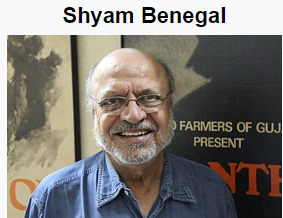
(Photo : wikipedia.org)
Veteran Filmmaker Shyam Benegal
- Celebrated Indian filmmaker Shyam Benegal passed away at 90, marking the end of an era in Indian cinema.
- Benegal, known for pioneering the parallel film movement in India, began his career with a documentary film in 1962.
- His films, including 'Ankur' and 'Mandi', won numerous awards and introduced actors like Shabana Azmi and Anant Nag.
- Benegal's legacy in Indian cinema will continue to inspire future generations of filmmakers.
The Indian film industry is in mourning following the loss of one of its most celebrated filmmakers, Shyam Benegal, who passed away at the age of 90 in Mumbai. Known for pioneering the parallel film movement in India, Benegal's demise marks the end of an era in Indian cinema. He had been suffering from a kidney ailment and was admitted to Wockhardt hospital in Mumbai. His funeral is scheduled to be held in Mumbai at 10:00 am on Tuesday.
Born in Hyderabad to Sridhar B. Benegal, a prominent figure in the field of photography, Shyam Benegal was the second cousin of the legendary Indian auteur Guru Dutt. He recently celebrated his 90th birthday in Mumbai, marking a lifetime of contributions to the Indian film industry.
Benegal's journey in the film industry began as a copywriter. His first venture into filmmaking was a documentary film in Gujarati, 'Gher Betha Ganga' in 1962. This marked the beginning of a career that would span over five decades and leave an indelible mark on Indian cinema.
A Pioneer of the New Wave Film Movement
His first four feature films 'Ankur' (1973), 'Nishant' (1975), 'Manthan' (1976) and 'Bhumika' (1977) were instrumental in pioneering the new wave film movement of that period. His contributions to the film industry were recognized with several honors, including 18 National Film Awards, a Nandi Award, the Dadasaheb Phalke Award, India's highest award in the field of cinema, a Padma Shri, and Padma Bhushan.
His film 'Mandi' (1983), is known for its satire on politics and prostitution, featuring performances by Shabana Azmi and Smita Patil. Benegal's career was not limited to the big screen. He also served as the Director of the National Film Development Corporation (NFDC) from 1980 to 1986.
When the Hindi cinema entered a period of lull in the 1980s, with even the mainstream films struggling at the box-office after the introduction of VCR, the fundings for the parallel films were considerably cut-down. However, Benegal turned to the new medium of television. His show 'Bharat Ek Khoj' is considered to be one of the iconic shows of India.
Legacy in Indian Cinema
His filmography is a testament to his versatility and his ability to adapt to changing times. His films introduced actors like Shabana Azmi and Anant Nag, and he won the 1975 National Film Award for Second Best Feature Film. Shabana won the National Film Award for Best Actress. His films were not just high in quality, but their subject and intent were quite good. He once mentioned, "'Sant Tukaram'. Marvellous! Vishnupanth Paganesh, the chap who played Sant Tukaram. His Bhavgitra were excellent. You should render them beautifully."
Benegal's films were known for their modern themes and plots, resonating with audiences across generations. His film 'Ankur', meaning seedling, was a parallel film that portrayed interrelationships between the people in a village and how they behaved under duress. His film 'Trikal', set in 1961 Goa, revolved around the life and tribulations of a fictional Goan Christian family called "Souza Soares". The film was invited to the London Film Festival 1986 and was selected for the Indian Panorama at Filmotsav 1986, and for the Indian Film Retrospective, Lisbon 1986.
Shyam Benegal's passing is a significant loss to the Indian film industry. His contributions to cinema, both in terms of his films and his role in shaping the parallel film movement in India, will continue to inspire generations of filmmakers. His legacy will live on through his films, his teachings, and his unwavering commitment to the art of cinema. His life and work serve as a reminder of the power of cinema to reflect and shape society, and his influence will continue to be felt for generations to come.
* This is a contributed article and this content does not necessarily represent the views of btin.co.in









